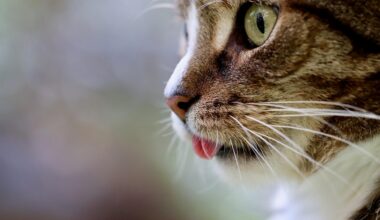Medications Commonly Prescribed for Feline Chronic Hepatitis
Feline Chronic Hepatitis is a significant health concern that cat owners must address promptly. It is crucial to understand the medications that are commonly prescribed to manage this disease. Here are some of the common choices: each with a specific role. Corticosteroids are often utilized to reduce inflammation in the liver. Typically, medications like prednisolone can help in suppressing the immune system’s reaction. Antibiotics, especially those belonging to the class of fluoroquinolones, may also be prescribed concurrently to combat bacterial infections that often accompany liver diseases. Ursodeoxycholic acid (UDCA) is another medication that aids in enhancing liver function and supports bile flow, thus preventing bile buildup. Other supportive treatments include dietary changes and specialized diets aimed at providing the right nutrients without overloading the liver. Owners must ensure regular veterinary check-ups to monitor the condition and adjust any medications as necessary, creating a comprehensive health plan that addresses both immediate and long-term needs for their feline companion.
Frequent blood tests will help determine the effectiveness of the medication regimen being employed. In some cases, medications are changed or adjusted based on how well a cat responds. Some veterinarians may also recommend using hepatoprotective agents, which are designed to protect the liver from further damage. Milk thistle and SAM-e (S-Adenosyl methionine) can play an important role in such therapies. SAM-e is beneficial in enhancing the liver’s detoxification processes and may improve liver enzyme levels. Another alternative approach is antiviral medications, particularly if viral infections are a suspected cause of liver issues. The combination of antiviral agents and supportive treatments aims to mitigate inflammation and promote overall liver health. Regular communication between the veterinarian and pet owner allows for an effective treatment plan and provides crucial peace of mind to those concerned about their feline friend. Understanding these medications enables cat owners to better advocate for their pet’s health, ensuring an informed and proactive approach.
It is important not to overlook the role of nutrition in the management of Feline Chronic Hepatitis. While medications play a key role, a proper diet can significantly enhance the treatment’s effectiveness. By focusing on high-quality protein sources and easily digestible carbohydrates, cats can gain the necessary nutrients without burdening the liver. Additionally, hydration is vital; encouraging water intake ensures the kidneys and liver function properly. Some cat owners opt for specialized diets formulated for hepatic support, which may contain added omega-3 fatty acids. These fats have anti-inflammatory properties and may improve overall liver health. Special treats and snacks must be carefully chosen as well, ensuring they align with the overall dietary goals. Consultation with a veterinarian can help determine the ideal nutritional plan for a cat with chronic hepatitis, which should evolve as the cat’s condition changes. Frequent reassessments of the dietary approach are essential, too, ensuring that any changes to the liver or overall health, are effectively addressed through diet.
In addition to conventional medications, owners may explore various alternative treatments. While these approaches should not replace standard veterinary care, they can serve as complementary options. One popular choice is acupuncture, which some believe can help with liver detoxification and improve overall energy levels in cats suffering from chronic ailments. Furthermore, herbal remedies such as dandelion root and artichoke extract have been suggested for liver health, as they may aid in digestion and stimulate bile secretion. Another alternative, probiotics, may support gut health which can impact liver function as well due to the liver-gut axis. These alternative therapies should always be discussed with a veterinarian before introducing them to ensure they will not interfere with any ongoing treatments or medications. An integrated approach often yields the best results, combining the strengths of both traditional and alternative medicine to optimize liver health and function.
Monitoring and Adjustments
Continuous monitoring is essential in managing Feline Chronic Hepatitis effectively. Therefore, routine check-ups and laboratory screenings are needed to evaluate liver function and overall health. Typically, veterinarians will assess specific liver enzymes, including ALT and AST, as these levels provide insight into the liver’s condition. If these levels are elevated, the medications prescribed may be adjusted accordingly. In cases where symptoms such as vomiting or diarrhea arise, it is vital to consult with a veterinarian immediately. Cat owners should also be proactive in documenting any changes in behavior, appetite, or gastrointestinal symptoms and discuss these with the veterinarian during appointments. Such collaboration ensures that the treatment plan remains effective as fluctuations in the cat’s health occur. When it comes to medications, veterinarians may also monitor for potential side effects of the various drugs used, and if present, may recommend alternatives or adjustments in dosages. This ongoing dialogue fosters a healthy partnership between pet owners and veterinarians, ultimately ensuring the best possible outcomes for feline patients facing chronic hepatitis challenges.
Furthermore, educating oneself about the implications of Feline Chronic Hepatitis is essential. Comprehensive knowledge enables pet owners to make informed decisions regarding treatment options. Numerous online resources provide useful information, including reputable veterinary websites and support groups for cat owners dealing with similar issues. Connecting with others who have faced similar challenges can provide emotional support and practical advice. Reviewing the pros and cons of various medications can facilitate more meaningful discussions with veterinarians. Additionally, online platforms may offer insights into recent advancements in treatment protocols or innovative therapies being researched. It is wise to remain up-to-date with the latest veterinary news regarding Feline Chronic Hepatitis. This understanding allows pet owners to advocate effectively for their beloved companions. The collective support of fellow cat owners and trusted veterinary professionals empowers individuals to navigate this complex landscape with persistence and hope, leading to better health outcomes.
Lastly, it’s vital to understand that managing chronic diseases like Feline Chronic Hepatitis demands patience. As treatments take time to show results, owners must remain committed throughout the process. While some medications can lead to improvements within weeks, others may take months of consistent treatment to achieve desired outcomes. Resilience and support from families enable owners to maintain a positive environment during challenging times. Celebrating small victories, such as stabilization of enzyme levels, can boost morale. Moreover, regular follow-ups with veterinarians help track progress and refine treatment strategies, adapting to the needs of each individual cat. Each journey with Feline Chronic Hepatitis is unique, and maintaining a steadfast commitment can lead to long-term management success. Although it may be difficult at times, the bond between cat owners and their pets can flourish through the challenges, ultimately ensuring that cats receive the best possible care needed for improved well-being and quality of life.
With ongoing advancements in veterinary medicine, new treatments and protocols for Feline Chronic Hepatitis are continually emerging. By staying informed about these updates, pet owners can explore innovative approaches to managing their cats’ conditions. Participating in research studies or clinical trials may provide access to cutting-edge therapies, benefiting those in need of optimal care. Should any new medications or techniques be suggested by veterinarians, cat owners should evaluate their effectiveness and discuss any concerns thoroughly. Embracing a proactive mindset ensures that caregivers are well-equipped to explore all avenues available. The world of veterinary medicine is ever-evolving, making it a unique time for enhancing the management of chronic illnesses. Together with their veterinary team, cat owners can strive towards achieving the best possible outcomes for their furry family members, ensuring that they lead healthy, fulfilling lives despite the diagnosis of chronic hepatitis.


